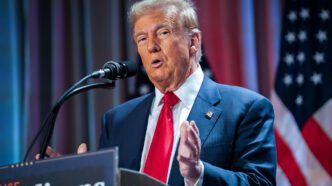In a stunning move that has sent shockwaves through Washington, former President Donald Trump has dismissed General Timothy Haugh, the top official overseeing both the National Security Agency (NSA) and U.S. Cyber Command. Haugh’s abrupt ousting, confirmed by multiple news outlets late Thursday night, has sparked confusion and concern across intelligence and defense circles.
General Haugh, a highly decorated military veteran with over 30 years of service, was appointed to lead the NSA and Cyber Command in February 2024. His tenure lasted just over a year, during which he steered the U.S.’s most powerful surveillance and cyber offense institutions amid rising global threats, including an intensifying cyber campaign from China.
The Washington Post first broke the story, followed by The New York Times, which revealed that the decision followed a meeting between Trump and right-wing activist Laura Loomer in the Oval Office. Loomer reportedly lobbied for the removal of Haugh and several other high-level national security officials during the closed-door session.
Also ousted was NSA Deputy Director Wendy Noble, the agency’s senior civilian official. The current leadership status of the NSA and Cyber Command remains unclear.
White House, Pentagon Stay Silent on Reasons
The White House has yet to comment publicly on why Haugh was removed. A spokesperson for the Department of Defense, which oversees the NSA, stated they were aware of the reports but declined to provide further details. The NSA itself referred all inquiries back to the Pentagon.
Eddie Bennett, the NSA’s spokesperson, also deferred comment to the Department of Defense. Meanwhile, uncertainty looms over who is currently in charge of the country’s key cyber intelligence operations.
Lawmakers Call the Dismissal ‘Astonishing’
The sudden shakeup blindsided members of Congress, particularly those who serve on intelligence oversight committees. Senator Mark Warner (D-VA), vice-chair of the Senate Intelligence Committee, condemned the move as reckless.
“General Haugh has served with honor and distinction for more than three decades,” Warner said in a statement. “At a time when the U.S. faces relentless cyber threats—especially after the Salt Typhoon cyberattack traced back to China—removing our top cyber defense official makes no strategic sense.”
Warner also blasted the administration for what he called a lack of accountability. He referenced a recent scandal in which members of Trump’s cabinet allegedly shared classified details about U.S. airstrikes in Yemen through a Signal group chat that mistakenly included a journalist.
Congressman Jim Himes (D-CT), who leads the House Intelligence Committee, echoed Warner’s concerns, saying he was “deeply disturbed” by the firing. He warned that such actions could undermine national security and morale within the intelligence community.
A Musk Meeting Adds to the Mystery
Adding another layer to the story, The Wall Street Journal reported that Elon Musk—who heads Trump’s Department of Government Efficiency—met with Haugh at NSA headquarters in Fort Meade, Maryland, in March. According to the NSA, the visit aimed to align agency priorities with Trump’s administrative goals.
Musk, known for his disruptive ideas and sweeping policy proposals, has publicly called for a full “overhaul” of the NSA. However, he has not offered any concrete plans. The timing of Haugh’s dismissal shortly after the meeting is raising eyebrows among political observers and intelligence experts alike.
Leadership Vacuum Amid Cyber Escalation
The U.S. is currently grappling with increasingly sophisticated cyberattacks from state-sponsored actors, particularly from China and Russia. The recent Salt Typhoon incident, where hackers reportedly infiltrated major telecom and internet infrastructure, underscored the urgent need for robust leadership in the nation’s cyber defenses.
With Haugh and Noble both out, and no clear interim successor announced, questions remain about the continuity of command at the NSA and Cyber Command. Critics argue that these decisions are politically motivated rather than grounded in national security interests.
For now, officials in Washington and beyond are left speculating about the administration’s next steps—and what these firings could mean for the U.S.’s cybersecurity future.













